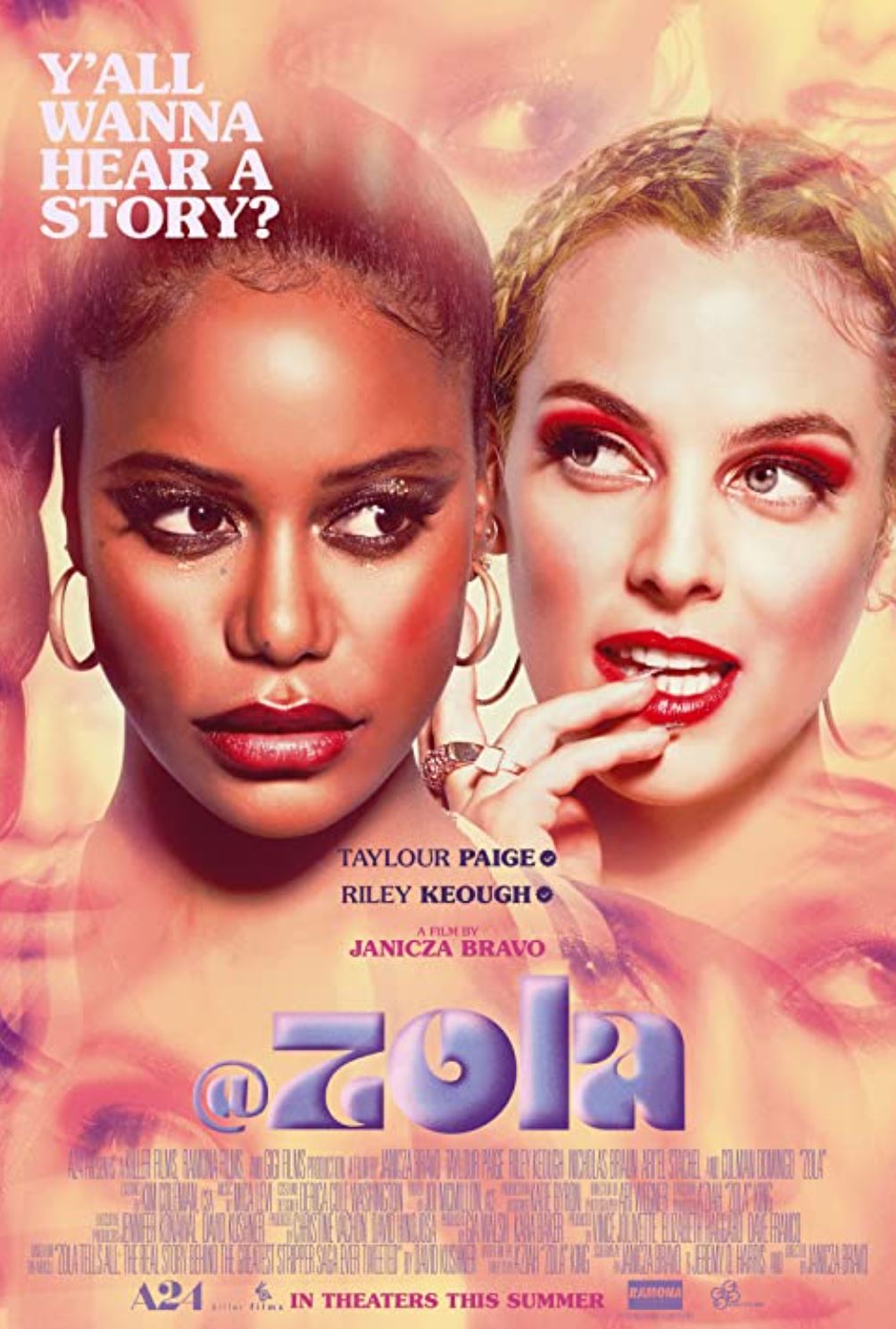Taylour Paige and Riley Keough in Zola



Back in 2015, Twitter lit up with a thread—the first official “thread”—from user @_zolarmoon. In it, A’Ziah “Zola” King recounted a fateful trip to Florida with a white friend, her sappy boyfriend, and her friend’s pimp. It was a wild, classically Floridian tale, though it began in Detroit, and Zola’s thread probably marks the zenith of Twitter as a sort of digital campfire around which we gather to entertain one another. Now, Zola’s legendary trip to Florida has been immortalized as Zola, a new film directed by Janicza Bravo (Lemon), and co-written by Bravo and Jeremy O. Harris, adapting from David Kushner’s behind-the-scenes accounting of Zola’s tale in Rolling Stone. Given the “can you believe this sh-t” tone of the reporting on Zola’s Twitter tale, this film could have been loud as hell, but Bravo has a light touch, letting scenes play out in relatively straightforward manner, and only interjecting stylized elements when it underscores the toxicity and racism inherent in the tale.
Comparisons to Harmony Korine are inevitable, and Zola would make a fun double bill with either Spring Breakers or The Beach Bum, but it’s really more in line with Sean Baker’s work in The Florida Project. Zola has a similar sense of unreality, of low and high culture mixing in a commercial borderland that feeds on America’s excesses. We meet Zola (a breakout Taylour Paige) first as a waitress in Detroit, which is where she encounters Stefani (Riley Keough, never better), a white woman with an outrageously offensive “Blaccent”. Stefani is the walking embodiment of white women putting on Black culture for funsies but dropping it the moment their whiteness protects them from the realities of Blackness. There could have been a lot of cinematic finger-pointing about how offensive and f-cked up Stefani, and her boyfriend Derrek (Succession’s Nicholas Braun), are for co-opting Black culture in this way, but instead, Bravo makes her point in one swift moment. Derrek, seated next to Zola in a car, flashes her a slightly stricken, embarrassed look as the true offense of Stefani’s whole affect sets in, but instead of insisting Stefani knock it off, he awkwardly doubles down.
A similarly swift, pointed moment tells us everything we need to know about Zola and Stefani as individuals. An overhead shot in a public bathroom reveals that Stefani sits directly on the seat, doesn’t wipe, and has neon yellow pee. Is it gross? Sure. But it’s also a perfect, single-shot story about how nasty Stefani really is. Bravo has a knack for these quick, devastating reveals. Zola is a stylish film—another good double bill would be with Lorene Scafaria’s Hustlers—but Bravo’s sense of style isn’t glamorous. She doesn’t linger on sleaze, but she doesn’t hide it, either, which makes her view of Florida particularly apt. There are ocean vistas and neon sunrises, but also scuzzy motels and even the nicer hotels have a similar vibe of dissipation. Florida is shady people in sunny places, and Bravo captures that perfectly, though her lens is never judgmental of sex work or sex workers. Bravo saves her condemnation for Stefani, who is only offensive for her affect, not her choice in work, and for her pimp, Z (Colman Domingo), who is legitimately frightening.
If anyone ever wonders why Zola doesn’t just bail on Stefani the moment their Florida trip takes a turn, it’s because of Z. As Zola, Paige code-switches constantly as the situation around her demands it, but as Z Domingo presents only two modes: scary and scarier. Scary comes with an American accent and casually friendly demeanor, but Scarier involves a personality shift and bouts of violence. You can see the moment Zola decides pushing Z isn’t worth it, and it’s impossible not to agree with her. Stefani is unreliable, but Z is unpredictable, and one of those things is considerably more dangerous than the other. Zola is upset at Stefani for luring her to Florida under false pretenses, but she is afraid of Z, and as the weekend wears on, Zola becomes ever more still as Paige’s performance tightens around Zola’s anxiety. As good as Paige is, though, it’s Colman Domingo’s charismatic but terrifying performance as Z that steals the whole film.
Zola is not a film for everyone. It’s just sleazy enough, just gross enough, to turn off anyone who doesn’t want to look at toilets and stripper poles. But if you’re not bothered by that stuff, it’s a funny, sad, eyebrow-raising tale of toxic friendship, white woman privilege, Florida, and exploitation. Janicza Bravo isn’t interested in the easy read on the story but instead digs into the dynamics of interracial friendship and the power dynamics of sex work, and how white women use and abuse Black women for their own gain. It’s a tightly told tale, not even 90 minutes with end credits, but loaded with cutting observations and keen insights into the predatory dynamics of interracial friendships. Zola is stylish, sleazy, entertaining as hell, but also a sharp look at the intersection of toxic friendships and racism.
Zola is now in theaters.
